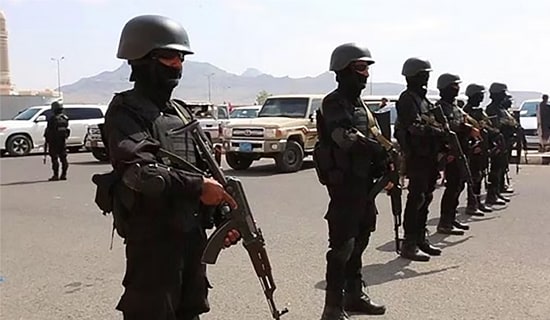The following report is now a complimentary offering from MEMRI's Jihad and Terrorism Threat Monitor (JTTM). For JTTM subscription information, click here.
On May 22, 2022, Jordanian security forces reported that four drug smugglers were killed and others were wounded in an ambush they set for a smugglers' cell that attempted to infiltrate from Syria. According to the report more than 600,000 Captagon pills and about 180,000 packets of hashish were confiscated in the operation, in addition to Kalashnikov rifles.[1]
This is yet another in a series of operations conducted since the start of the year by the Jordanian security apparatuses which have thwarted attempted drug smuggling, and senior Jordanian officials claim that it reflects the steep rise in the phenomenon of drug smuggling from southern Syria into the kingdom. These officials openly referred to the involvement of organizations with connections to Iran.
At the same time, in recent days Syrian opposition websites have reported that Hizbullah is currently increasing its activity in this sphere.

The drugs in the above photograph were confiscated by the Jordanian security forces (Source: jo24.net, on May 19, 2022)
The following is a review of Jordanian claims and Syrian opposition website reports regarding drug-smuggling from Syria:
Syrian Opposition Websites: Significant Increase in Hizbullah Drug Activity in Southern Syria
On May 21, 2022, the Suwayda24 Syrian opposition website reported that a group of Hizbullah operatives from Baalbek in Lebanon had recently arrived in the city of Al-Suwayda' in southwestern Syria to supervise the building of small Captagon factories in the area, in cooperation with local groups supported by the Syrian security forces. According to the website, Hizbullah operatives transferred machines for the production of Captagon pills from the rural area of Homs to Al-Suwayda' and oversaw the construction of the factory, in exchange for between $75,000 and $100,000.
The website states that the information it is privy to indicates a close connection between a smugglers' cell that is active in southern Syria and officers and senior officials in the military intelligence apparatuses of the Syrian regime. Suwayda24 adds that more than 20 bands of smugglers are active in the villages on the Syria-Jordan border, especially those in southeast Al-Suwayda'. In most cases the members of these bands are also members of the Syrian security apparatuses or have connections to them. The smugglers transfer the drugs to other bands in the border villages, which are usually members of the local tribes, who then smuggle the drugs into Jordan. According to the website, since the beginning of the year 24 people have been killed while attempting to illegally cross the border into Jordan and the Syrian Border Security Force has arrested about 20 smugglers only to subsequently free them a month later after receiving $100,000.[2]
Meanwhile, the Syrian opposition website of the Syrian Observatory for Human Rights (SOHR) information office has reported that local smuggling cells with connections to Hizbullah have recently increased the transfer of drugs and raw materials for the production of Captagon from Lebanon to areas in Al-Qalamoun in Rif Dimashq and Al-Qusayr, a Hizbullah stronghold in the rural area of Homs, and from there to southern Syria. SOHR also reports that one of the four smugglers who were killed by the Jordanian Armed Forces on May 22 was the commander of a cell with strong ties to two Hizbullah commanders. According to the website, that cell numbers dozens of operatives who are residents of Daraa and Al-Suwayda'.[3]
Senior Jordanian Officials: Organizations with Links to Iran are involved in Drug Smuggling from Syria to our Region
Reports about Syria's transformation, since the outbreak of civil war, into a base for a far-reaching drug industry led by Hizbullah and the regime of Bashar Al-Assad, are nothing new, and the same goes for drug smuggling into Jordan.[4] However, it seems that in the recent period there has been a significant increase in this activity and the extent of the drug smuggling into Jordan. Jordan's King Abdullah and senior officials from the Jordanian security forces have referred to the growing danger to national security posed by Iran-backed organizations which have partners among elements in the Syrian regime.
An episode of the "Battlegrounds" interview series hosted by Stanford University's Hoover Institution was added to the Jordanian Royal Palace YouTube channel on May 19. That episode contained an interview conducted by former U.S. National Security Advisor General (Ret.) H.R. McMaster with Jordan's King Abdullah, who mentions the danger to his country from its border with Syria, without explicitly stating what he is referring to. The king says, "We are seeing border attacks on a regular basis, and we know who is behind that."
Expressing concern about a withdrawal of Russian forces from southern Syria, Abdullah says, "That vacuum will be filled by the Iranians and their proxies. So, unfortunately, we are looking at maybe an escalation [of] problems on our borders."[5]

Several days earlier, Brigadier General Ahmed Hashem Khalifat, the director of the Border Security Directorate in the Jordanian Armed Forces said, "Undisciplined forces from the Syrian army are collaborating with drug smugglers. The gangs of drug smugglers have become organized and are supported by these forces and by the security apparatuses, in addition to Hizbullah and Iranian militias which are deployed in southern Syria and carry out smuggling [operations] across our border." He added that since the beginning of the year there has been an increase in the quantities of drugs which have been captured, which number 19 million Captagon pills, half a million packets of hashish, and other drugs – a significant increase since last year when 14 million pills and 15,000 packets of hashish were confiscated."[6]
Similar information was provided by Colonel Mustafa Al-Hiyarim, head of the military media in the Jordanian Armed Forces. On May 23 he said that the Jordanian army is waging a "drug war" on its northern border. He further described it as coordinated smuggling led by efficient organizations supported by "foreign elements," and stated that the cells receive assistance from undisciplined groups which are part of the Syrian Border Security Force and from other groups. In addition to terrorist organiazations stationed along Jordan's northern border which threaten the country, Al-Hiyarim also mentions "Iranian organizations" which he contends "are more dangerous since they receive instructions from external elements and seek to harm Jordanian national security."[7]
[1] Alrai.com, May 22, 2022.
[2] Suwayda24.com, May 21, 2022.
[3] Suwayda24.com, May 21, 2022.
[4] See for example MEMRI JTTM Reports: Hizbullah Is Running A Drug Industry In Syria With The Knowledge And Collaboration Of The Regime, According To Syrian Opposition Websites, November 17, 2021; Syrian Rebel News Outlet: Damascus Has Become World's "Captagon Capital," Lebanese Hizbullah And Iran Have Opened Hundreds Of Front Companies In Syria To Launder Drug Money, December 21, 2021; and Syrian Opposition Website: Groups Affiliated With Hizbullah Assist With Drug Smuggling To Jordan Which Contributes To Growing Tension On Syria-Jordan Border, February 15, 2022.
[5] See MEMRITV clip: Jordan's King Abdullah II In Interview With General H. R. McMaster: Russia's Withdrawal From Southern Syria Creates A Vacuum To Be Filled By Iran And Its Proxies; We Hope Dialogue With Iran Will Have A Positive Effect, May 19, 2022.
[6] Alghad.com, May 15, 2022.
[7] Alghad.com, May 23, 2022.
The full text of this post is available to subscribers.
Please login or register to request subscription information from MEMRI






